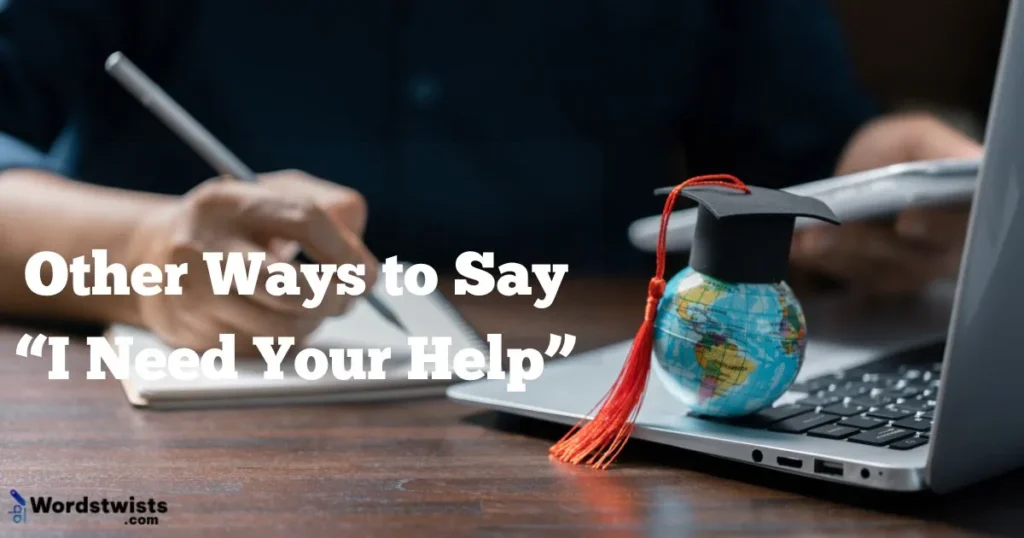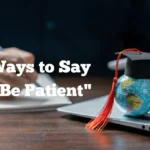Have you ever caught yourself saying “I need your help” a little too often—especially in emails, messages, or even in daily conversations? It’s one of those everyday phrases that gets the job done, but let’s be honest—it can start sounding a bit dull or even desperate when used on repeat.
Whether you’re asking for support at work, requesting a favor from a friend, or reaching out for guidance, using the same phrase again and again can make your words feel flat or generic. That’s where a little creativity goes a long way.
In this post, you’ll discover 25 compelling alternatives to “I need your help” that are not only more expressive but also more personal, respectful, and confident. These alternatives will give your speech and writing a much-needed refresh, while still getting your message across clearly and sincerely. Whether you’re trying to sound more polite, more professional, or just more human—this list has got you covered.
So, if you’re ready to boost your communication skills and sound more thoughtful and engaging when you ask for assistance, keep reading. These powerful expressions will help your words stand out—and get the response you’re looking for.
Better Ways to Say “I Need Your Help”
1. Can I count on you?
This phrase builds trust and invites someone to be dependable in a kind and direct way.
Examples:
- “The project is tight on deadline—can I count on you to help wrap it up?”
- “Can I count on you to give me a hand with this?”
- “We’ve got a lot on our plate. Can I count on you for support?”
- “I’m a bit stuck—can I count on you to help figure this out?”
- “Can I count on you to take over while I’m away?”
Why it works:
It subtly expresses your trust in someone while still making a clear request. It feels less like begging and more like partnership.
2. I’d really appreciate your support
This version sounds heartfelt and sincere—great for both personal and professional settings.
Examples:
- “This task is overwhelming. I’d really appreciate your support.”
- “I’d really appreciate your support on this big client call.”
- “I’ve hit a wall—I’d really appreciate your support moving forward.”
- “I’d really appreciate your support with the event setup.”
- “Even a few minutes would help. I’d really appreciate your support.”
Why it works:
It’s a polite, emotionally intelligent way to ask for help without pressure. It also shows gratitude in advance.
3. Could you lend a hand?
This one is casual, friendly, and sounds like something you’d say face-to-face.
Examples:
- “Hey, could you lend a hand with these boxes?”
- “Could you lend a hand finishing up the design?”
- “Mind taking a quick look? Could you lend a hand?”
- “Could you lend a hand with dinner tonight?”
- “We’re short-staffed—could you lend a hand on this?”
Why it works:
It’s approachable and informal. Perfect when asking peers or friends for quick, hands-on support.
4. I’m reaching out for your guidance
This is ideal when you want to sound thoughtful, especially in professional or mentoring situations.
Examples:
- “I’m stuck on the next steps and reaching out for your guidance.”
- “Before I make a decision, I’m reaching out for your guidance.”
- “This is new territory—I’m reaching out for your guidance.”
- “I really respect your experience, so I’m reaching out for your guidance.”
- “We’re reworking the plan, and I’m reaching out for your guidance on it.”
Why it works:
It positions the other person as a trusted expert. Shows humility while maintaining professional respect.
5. I’d value your input
This phrase is about showing respect for someone’s opinion or expertise.
Examples:
- “We’re finalizing the draft, and I’d value your input.”
- “Before we go live, I’d value your input on the final version.”
- “I’d value your input on how to handle this client.”
- “We’re brainstorming ideas—I’d value your input.”
- “I’d value your input on this decision—it matters.”
Why it works:
You’re not just asking for help—you’re giving someone a voice. It builds collaboration and mutual respect.
Read More: Other Ways to Say “I Told You So”
6. Would you mind assisting me?
This is a courteous and professional way to ask for help, especially in formal or workplace communication.
Examples:
- “Would you mind assisting me with the quarterly report?”
- “Would you mind assisting me while I update the database?”
- “I’m preparing for the meeting—would you mind assisting me with the slides?”
- “Would you mind assisting me in checking the final edits?”
- “Would you mind assisting me while I sort out the tech issues?”
Why it works:
It’s a respectful and polished phrase that softens the request and shows appreciation for the person’s time.
7. I could use your expertise
This highlights the other person’s skills and strengths, which makes them feel valued.
Examples:
- “I could use your expertise on this design layout.”
- “Mind reviewing this proposal? I could use your expertise.”
- “We’re facing some challenges—I could use your expertise.”
- “I could use your expertise in planning this strategy session.”
- “Can we talk later? I could use your expertise on something tricky.”
Why it works:
It flatters the person while being specific. People love being recognized for their knowledge and talent.
8. I’m in need of a favor
This phrase feels friendly and human. It’s great for more casual or personal conversations.
Examples:
- “Hey, I’m in need of a favor—can you cover my shift?”
- “I’m in need of a favor. Mind watching my dog this weekend?”
- “Can we chat later? I’m in need of a favor.”
- “I’m in need of a favor. Can you help me prep for the test?”
- “I’m in need of a favor. Could you review this quickly?”
Why it works:
It sets a relatable tone and is easy to understand. It’s perfect when you want to keep things light but sincere.
9. Your advice would mean a lot
Use this when you’re not just looking for help—you want insight and wisdom.
Examples:
- “I’m feeling stuck—your advice would mean a lot.”
- “Before I move forward, your advice would mean a lot.”
- “We’ve never done this before, and your advice would mean a lot.”
- “Your advice would mean a lot on how to navigate this situation.”
- “Your advice would mean a lot as I make this choice.”
Why it works:
It’s emotionally respectful and shows you truly value the person’s opinion, not just their time or effort.
10. I’m hoping you can help
This phrase is soft and kind, expressing hope without pressure.
Examples:
- “I’m stuck and I’m hoping you can help.”
- “We’re on a tight deadline—I’m hoping you can help.”
- “It’s a little overwhelming, and I’m hoping you can help me sort it out.”
- “I’m hoping you can help with the final details.”
- “I’m hoping you can help us troubleshoot the issue.”
Why it works:
It comes across as genuine and human, not demanding. It invites the other person to step in kindly.
11. Could you walk me through this?
This is ideal when asking someone to explain or teach something step-by-step.
Examples:
- “This software’s new to me—could you walk me through this?”
- “Could you walk me through this contract before I sign?”
- “I’m a bit confused. Could you walk me through this spreadsheet?”
- “Could you walk me through this part of the process again?”
- “Before I present, could you walk me through this draft?”
Why it works:
It asks for hands-on guidance without sounding clueless. Very useful in learning or professional settings.
12. I’d be grateful for your help
A warm and gracious way to request support—great for emails or messages.
Examples:
- “I’m juggling a lot—I’d be grateful for your help with this task.”
- “I’d be grateful for your help proofreading the report.”
- “It’s a bit too much to handle alone—I’d be grateful for your help.”
- “Even just a quick review—I’d be grateful for your help.”
- “I’d be grateful for your help prepping for the workshop.”
Why it works:
It combines humility and appreciation in one short, powerful phrase.
13. Can you offer some support?
This is a simple, polite, and non-intrusive way to ask.
Examples:
- “Can you offer some support while I get this organized?”
- “We’re launching soon—can you offer some support on the backend?”
- “It’s been a hectic week—can you offer some support at the event?”
- “Can you offer some support for the presentation tomorrow?”
- “I need an extra hand—can you offer some support?”
Why it works:
It’s open-ended and respectful, giving the other person flexibility to say yes or offer suggestions.
14. May I ask for your assistance?
This one is extra polite—great for customer service, business communication, or formal writing.
Examples:
- “May I ask for your assistance with this policy review?”
- “We’re short-staffed—may I ask for your assistance today?”
- “May I ask for your assistance gathering the materials?”
- “This issue is urgent—may I ask for your assistance resolving it?”
- “May I ask for your assistance in connecting with the client?”
Why it works:
It’s graceful and courteous, perfect when you need to maintain a professional tone.
15. I’m relying on you for this
This phrase adds a sense of trust and responsibility, ideal for teamwork.
Examples:
- “I can’t do it all—I’m relying on you for this part.”
- “I’m relying on you for this, so let me know if anything’s unclear.”
- “The timeline’s tight—I’m relying on you for this.”
- “This one’s in your hands—I’m relying on you for this detail.”
- “I’m relying on you for this, and I know you’ll do great.”
Why it works:
It builds confidence and accountability while clearly signaling that support is needed.
16. Would you be open to helping me?
This is a respectful and gentle way to ask for assistance without putting pressure on the other person.
Examples:
- “Would you be open to helping me finalize this proposal?”
- “I’m stuck on this part—would you be open to helping me troubleshoot it?”
- “Would you be open to helping me prep for the interview?”
- “It’s outside my skill set—would you be open to helping me with this?”
- “Would you be open to helping me during the transition?”
Why it works:
It’s invitational, not demanding. It makes the other person feel like they have a choice, not an obligation.
17. I need a second pair of eyes
This idiomatic expression is perfect when you want someone to review or double-check something.
Examples:
- “I’ve read this three times—I need a second pair of eyes.”
- “Before I send this out, I need a second pair of eyes on it.”
- “This layout looks off—I need a second pair of eyes to spot what I’m missing.”
- “I need a second pair of eyes on this data—it doesn’t look right.”
- “Can you skim this for errors? I need a second pair of eyes.”
Why it works:
It feels casual and smart, and it’s clear you’re asking for feedback or review, not heavy lifting.
18. I’m hoping for your insight
When you want more than just a task completed, this phrase invites ideas, wisdom, or perspective.
Examples:
- “I’m unsure which direction to take—I’m hoping for your insight.”
- “I’m hoping for your insight on this tricky client situation.”
- “Your experience matters here—I’m hoping for your insight.”
- “This is new for me—I’m hoping for your insight before I move forward.”
- “I’m hoping for your insight on how we can improve our approach.”
Why it works:
It flatters the person’s judgment and encourages a collaborative tone. Perfect for strategic or thoughtful conversations.
19. Could you step in for a moment?
This is a friendly, short-term way to ask someone to assist or temporarily take over something.
Examples:
- “I’m tied up—could you step in for a moment and handle the call?”
- “We need someone to manage the queue—could you step in for a moment?”
- “I’ve got to run—could you step in for a moment and guide the team?”
- “Could you step in for a moment while I sort this out?”
- “It’s a quick fix—could you step in for a moment and take a look?”
Why it works:
It’s non-committal, easy-going, and implies a temporary favor, which people are more likely to agree to.
20. Your support would go a long way
This phrase highlights how meaningful the help would be, showing deep appreciation in advance.
Examples:
- “We’re behind schedule—your support would go a long way.”
- “Just a little help and your support would go a long way.”
- “Your support would go a long way in making this event successful.”
- “It’s been a tough day—your support would go a long way.”
- “If you could review this quickly, your support would go a long way.”
Why it works:
It conveys empathy, urgency, and gratitude all in one. Ideal for delicate or emotionally charged situations.
21. Can you help me figure this out?
This phrase is casual and clear. You’re inviting someone to solve a problem with you.
Examples:
- “This just isn’t clicking—can you help me figure this out?”
- “The numbers don’t match—can you help me figure this out?”
- “I’m overthinking it—can you help me figure this out?”
- “Can you help me figure this out? I’m not sure where to start.”
- “I’ve hit a wall—can you help me figure this out?”
Why it works:
It creates a teamwork vibe and sounds sincere, like you’re inviting the person to brainstorm with you.
22. I could use a helping hand
This friendly expression is warm and familiar, making it great for personal requests.
Examples:
- “The house is a mess—I could use a helping hand.”
- “I could use a helping hand organizing this paperwork.”
- “I’ve got a lot going on—I could use a helping hand right now.”
- “This setup takes time—I could use a helping hand getting started.”
- “I could use a helping hand unloading these boxes.”
Why it works:
It’s simple, down-to-earth, and relatable. It doesn’t sound needy—it sounds like a friendly ask.
23. I’m looking for a bit of help
A soft, non-demanding way to let someone know you’re in need of light support.
Examples:
- “I’m looking for a bit of help wrapping this up.”
- “I’m behind schedule—just looking for a bit of help finishing.”
- “I’m looking for a bit of help with formatting this doc.”
- “This part’s confusing—I’m looking for a bit of help.”
- “We’re stuck—I’m looking for a bit of help to get through it.”
Why it works:
It shows that your request is small and manageable, making it more likely the person will say yes.
24. Mind lending your expertise?
This one combines respect and casual tone, great for asking someone skilled to weigh in.
Examples:
- “Mind lending your expertise on this product description?”
- “Mind lending your expertise to smooth out the design?”
- “We need a pro eye—mind lending your expertise?”
- “Mind lending your expertise on the pitch deck layout?”
- “Before I move forward, mind lending your expertise?”
Why it works:
It flatters their talent or knowledge, and the “mind” makes it sound friendly and optional.
25. I’d love your input on this
This phrase feels open, warm, and collaborative—perfect for asking for creative or thoughtful contributions.
Examples:
- “I’d love your input on this campaign idea.”
- “Before I submit this—I’d love your input on this version.”
- “I’d love your input on this article title—what do you think?”
- “Here’s my draft—I’d love your input on this section.”
- “It’s almost ready—I’d love your input on this.”
Why it works:
It frames the request as an invitation, not a burden. It shows genuine interest in the other person’s thoughts.
Conclusion
No one likes to sound like a broken record—and with this list of fresh, expressive alternatives to “I need your help,” you won’t have to. Whether you’re sending an email, texting a colleague, or speaking face-to-face, these phrases let you ask for assistance in a way that’s more human, respectful, and memorable.
Use them to show confidence, gratitude, or even humility—whatever fits your situation best. Your words will feel more intentional, and people will respond better when they feel you’ve put thought into your ask.

I’m Leo Knox, the wordplay wizard behind WordsTwists.com where I turn everyday meanings into funny, clever, and creative twists. If you’re tired of saying things the boring way, I’ve got a better (and funnier) one for you!


